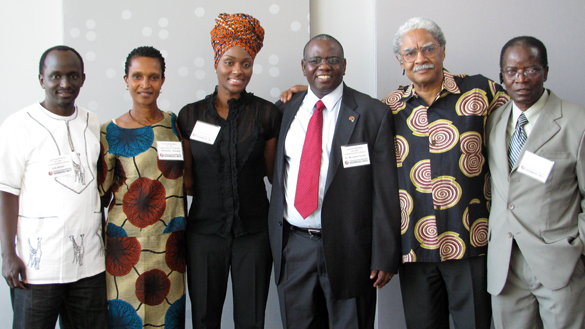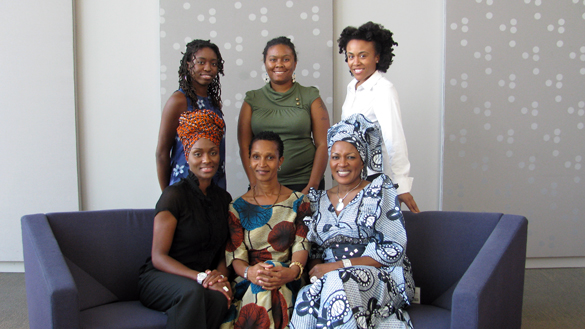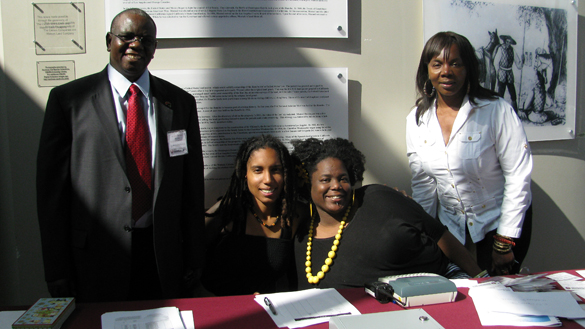The 2nd Annual Pan African Global Trade & Investment Conference was hosted by California State University, Dominguez Hills in conjunction with the UCLA Anderson School of Management on Oct. 13-15, with events taking place at both institutions. International representatives of African nations and the African Diaspora met with Los Angeles business owners, academics, and entrepreneurs to discuss possibilities for establishing trade, expansion of global concerns, and the largely untapped potential of Africa and its resources.

Munashe Furusa, acting associate dean of the College of Arts and Humanities, is also the executive director of the CSU Dominguez Hills California African American Political and Economic Institute (CAAPEI), which helped organize the conference. He said that this annual conference offers a great opportunity to focus on the development of the emerging economies of Africa and inner city communities in the United States, and that the potential for business growth in Africa will benefit the U.S. in profound ways.
“There is great potential for bilateral trade and investment between the U.S. and Africa as Africa is emerging in the world market in terms of investment and marketing goals,” he said. “We felt that it was really critical to begin to have this dialogue on how American and African governments can create the necessary policy and institutional environment to appropriately and effectively harness the economic potential of the African Diaspora.”
Furusa said that the academic community will also benefit from an expansion of trade with Africa, with possibilities for international training of students from both the U.S. and African nations.
“Another benefit that is going to come from this conference is the opportunity to develop academic programs,” said Furusa. “I was talking to one of the delegates from the Port of Durban, South Africa, who indicated that they have scholarships for their students and that they are looking to find programs that would help expand the infrastructure and manpower of their port. If we have a program that will fit their needs, we can develop an agreement with them to train their students. This conference offers a great opportunity for dialogue between the business community and our university. This is a great opportunity to internationalize our campus.”

Topics of discussion at the conference included regulations and supervision of African financial markets; further development of the Port of Durban, South Africa, as a centralized hub of trade; and the role of women in international trade. CSU Dominguez Hills was represented in the discussions by Furusa, co-chair of the conference as well as Tayyeb Shabbir, associate professor of finance, who moderated a panel on “Key Port Infrastructure Development, Tourism & Procurement Opportunities;” and Salim Faraji, who presented on the panel on “Historic, Political and Economic Significance of Africa’s Tripartite Free Trade Agreement. In addition, Guy Fox, chairman of the District Export Council of Southern California, and vice chair of the College of Business Administration and Public Policy Advisory Board, spoke on “Assistance with Documentation & Logistics.”
Al Washington, executive director of the Africa-USA International Chamber of Commerce & Industry, created the Pan African Conference in 2010, when it was also hosted by CSU Dominguez Hills. He was introduced to the university as a possible venue by former CAAPEI executive director David Horne and was impressed with the institution’s support of such an event.
“[CSU Dominguez Hills] literally opened the door for us, and said, ‘We’d love to have you here,’” said Washington. “They did everything they could to make us feel comfortable. They said, ‘Work with Munashe, and you’ll be taken care of.’ And they were right.”
Washington underscored the connection between higher education and the collaborative spirit of the conference.
“It made sense, because for what we were trying to accomplish at the conference, a university setting was the best place,” he said. “What we have here is an environment in which we can do both – academic programs and community programs. We’re looking at opportunities for training and education, both in international trade and commerce as it relates to real opportunities. What we present are things that are actually happening on the Continent that we can build programs around.

“There are research and training programs that can come out of this, cross-cultural education, student exchange programs, and local programming. We can actually train and prepare small businesses to get involved in international trade through the resources… in a campus setting, which gives us a lot more credibility in the eyes of the community and potential funders.”
Adrienne McKinney, a senior majoring in sociology with minors in Africana studies and communications, coordinated volunteers for the Pan African Conference. She said that it was a valuable experience hearing about key movements in establishing more African trade and connecting resources across the globe.
“The emphasis is on sharing and a bilateral situation [of] what we can bring to the table and how we can mutually benefit each other,” she said. “China and India are already going to Africa and investing in the infrastructure. It’s about extending a hand to Africans in the Diaspora to invest back in Africa, but also Americans in general, who have a lot to offer, especially small businesses.”
McKinney emphasized the wealth of natural resources in Africa as one of the advantages of growing American trade there. She also noted that the example of entrepreneurism was something that would benefit students who had the opportunity to witness the conversations at conference.
“I feel pretty positive and excited about what I’m hearing,” she said. “There is real work that needs to be done, agriculture, building, even investing and administration.
“You’re taught to go on and get a good job, maybe a civil service job [and work for] somebody else,” McKinney said. “With the state of the economy right now, that’s not necessarily guaranteed. [Students] need to be thinking in terms of ourselves –what kind of business can I create for myself? How can I pick up the skills needed? So it’s very eye-opening.”